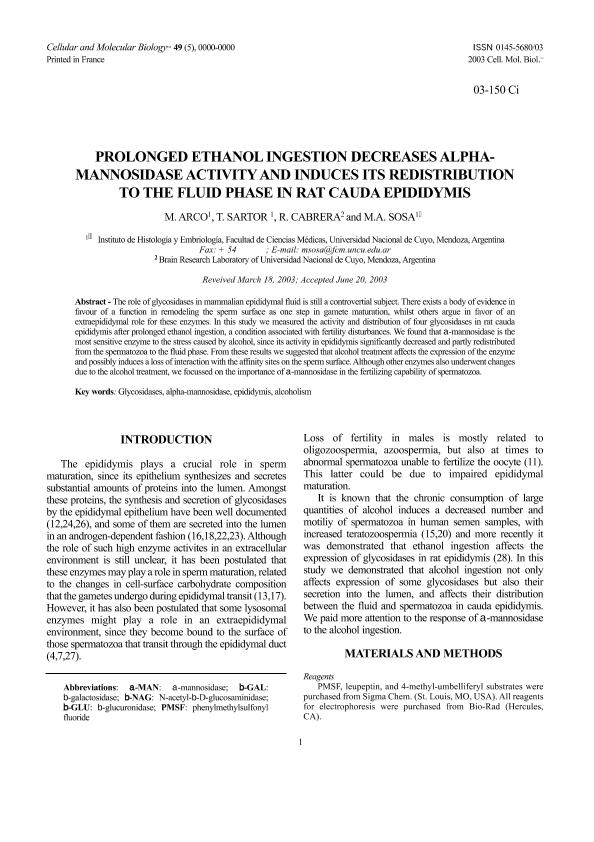Artículo
Prolonged ethanol ingestion decreases alpha-mannosidase activity and induces its redistribution to the fluid phase in rat cauda epididymis
Fecha de publicación:
06/2003
Editorial:
C M B Association
Revista:
Cellular and Molecular Biology
ISSN:
0145-5680
Idioma:
Inglés
Tipo de recurso:
Artículo publicado
Clasificación temática:
Resumen
The role of glycosidases in mammalian epididymal fluid is still a controvertial subject. There exists a body of evidence in favour of a function in remodeling the sperm surface as one step in gamete maturation, whilst others argue in favor of an extraepididymal role for these enzymes. In this study we measured the activity and distribution of four glycosidases in rat cauda epididymis after prolonged ethanol ingestion, a condition associated with fertility disturbances. We found that alpha-mannosidase is the most sensitive enzyme to the stress caused by alcohol, since its activity in epididymis significantly decreased and partly redistributed from the spermatozoa to the fluid phase. From these results we suggested that alcohol treatment affects the expression of the enzyme and possibly induces a loss of interaction with the affinity sites on the sperm surface. Although other enzymes also underwent changes due to the alcohol treatment, we focussed on the importance of alpha-mannosidase in the fertilizing capability of spermatozoa.
Palabras clave:
Glycosidases
,
alpha-mannosidase
,
epididymis
,
alcoholism
Archivos asociados
Licencia
Identificadores
Colecciones
Articulos(IHEM)
Articulos de INST. HISTOLOGIA Y EMBRIOLOGIA DE MEND DR.M.BURGOS
Articulos de INST. HISTOLOGIA Y EMBRIOLOGIA DE MEND DR.M.BURGOS
Articulos(IMBECU)
Articulos de INST. DE MEDICINA Y BIO. EXP. DE CUYO
Articulos de INST. DE MEDICINA Y BIO. EXP. DE CUYO
Citación
Arco, M.; Sartor, Tirso; Cabrera Kreiker, Ricardo Jorge; Sosa Escudero, Miguel Angel; Prolonged ethanol ingestion decreases alpha-mannosidase activity and induces its redistribution to the fluid phase in rat cauda epididymis; C M B Association; Cellular and Molecular Biology; 49; 6; 6-2003; 953-957
Compartir




